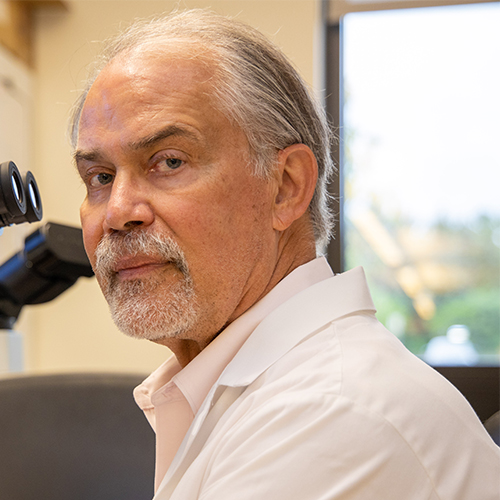News Archive
Filter by Division
Filter by Categories
Detroit's Daily Docket Returns for Season 2
February 25, 2021 / ForensicsDetroit's Daily Docket (D3), a podcast produced by Michigan Medicine forensic pathologists at the Wayne County Medical Examiner’s Office (WCMEO), launched its initial season in 2020. This successful podcast series is now gearing up to launch Season 2 on February 26, 2021.
Linda O'Brien retires after 30 years!
February 24, 2021 / RetirementThe Department of Pathology bids a fond farewell to administrative assistant Ms. Linda O’Brien, who is set to retire from the Department at the end of February. Linda leaves the department with over 30 years of service, primarily working with the GI pathology faculty [...]
Stressed Cellular Protein HOPS Into Action
February 16, 2021 / Experimental PathologyResearch team discovered that proteins with the capacity to multimerize quickly responded to osmotic changes (dehydration) caused by high saline or sugar concentrations, condensing into aggregates resembling processing bodies (P-bodies). The reaction, known as hyperosmotic phase separation, or HOPS, takes only a few seconds and is reversible within less than 2 minutes [...]
UM vs MSU Winter Blood Battle!
February 16, 2021 / Blood BankThe Annual Winter Blood Battle has begun! This year our opponent is Michigan State University. Our goal: To collect more pints of blood donated between February 10 and February 28, 2021 than MSU. All blood donors who register to donate as part of our U-M BB Team, will receive a Blood Battle T-shirt, a coupon for Washtenaw Dairy (while supplies last) and be entered into a raffle for gift cards to local business along with other great prizes. This is a win-win for you and the patients who receive your donated blood products. Let's make this a win-win-win as we beat MSU!
Role of BATF in the Development of Innate Lymphoid Cells Elucidated
February 10, 2021 / FacultyA series of sophisticated processes are required in the development of innate lymphoid cells (ILC) for them to reach maturity. The Kim laboratory discovered that basic leucine zipper ATF-like transcription factor (Batf) regulates the production of ILC progenitors in the bone marrow as well as the maintenance of ILCs in the periphery. These cells are strategically distributed in peripheral tissues to provide important innate immunity to fight pathogens such as pathogenic viruses and bacteria.
Prognostic Subgroups of Merkel Cell Carcinoma Defined
February 9, 2021 / CancerA collaboration between the Department of Pathology and the Department of Dermatology examined biomarkers of outcomes in 346 cases of Merkel cell carcinoma (MCC), an aggressive type of skin cancer. The study was published in the recent edition of Clinical Cancer Research [...]
The multi-faceted role of the SUV family of H3K9 methyltransferases
February 8, 2021 / Clinical PathologyA new study from Drs. Andrew Muntean and Nirmalya Saha of the Department of Pathology's Muntean Lab was just published in Biochim et Biophysica (BBA) Reviews on Cancer. The research project sheds light on the multi-faceted role of the SUV family of H3K9 methyltransferases in carcinogenesis and within cancer progression.
Honoring Bill LeBar as he Retires from Clinical Microbiology
February 5, 2021 / RetirementThursday, January 28th, was a bittersweet day for the Department of Pathology. Bill LeBar, Administrative Manager of the Clinical Microbiology Laboratory, retired after more than 12 years of service. A virtual retirement ceremony was held in his honor, with more than 50 faculty, staff, and family members attending [...]
And the Answer Is...Check QBank!
February 3, 2021 / ResidentsThe plethora of knowledge that pathology residents are expected to master – for future practice and especially for Boards – is overwhelmingly immense. Second-year resident, Dr. Ryan Landvater, has been working on a question bank software from scratch, in an effort to make the mastery of pathology knowledge less intimidating. Below is a short interview with Landvater, as well as screenshots of the QBank (beta version)...
A Holistic Approach
February 2, 2021 / InsidepathAfter 35 years, the Division of Education continues to bring the best pathology education in the country.
Faculty Spotlight: Chen Yang, MD, PhD
February 1, 2021 / Faculty SpotlightDr. Chen Yang joined the faculty of the Michigan Medicine Departments of Pathology and Pediatrics in a joint recruitment effort in July 2020. He serves as the associate director of the Clinical Cytogenetics Lab (Pathology) and MMGL Molecular Genetics Lab (Pediatrics). Yang’s appointment is rather unique in that he has a 50% appointment in each department. Usually, faculty have a primary appointment in one department and a secondary “dry” appointment in another department.
Research from Dr. Udager Published in European Urology
February 1, 2021 / CancerA new publication, generated by Department of Pathology faculty members Drs. Aaron Udager and Scott Tomlins was successfully published in European Urology. The research highlights a longitudinal cohort study centered around the serial molecular profiling of low-grade prostate cancer in order to better assess tumor upgrading [...]










 ON THE COVER
ON THE COVER
 ON THE COVER
ON THE COVER
 ON THE COVER
ON THE COVER
 ON THE COVER
ON THE COVER
 ON THE COVER
ON THE COVER
 ON THE COVER
ON THE COVER
 ON THE COVER
ON THE COVER
 ON THE COVER
ON THE COVER
 ON THE COVER
ON THE COVER
 ON THE COVER
ON THE COVER
 ON THE COVER
ON THE COVER
